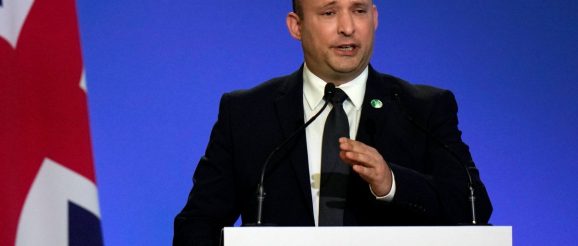In Glasgow, Bennett vows to harness Israeli ‘innovation’ against climate change – Israel News – Haaretz.com

Glasgow – Prime Minister Naftali Bennett pledged to mobilize Israeli “innovation and ingenuity” to combat climate change as he delivered his speech at the Glasgow climate change summit on Monday.
“As we gather here today in Glasgow,” Bennett said, “we know that history will judge our generation’s response to this threat – not by how ambitious we are; but by the practical steps we take.”
The prime minister warned that “behavioral change will only take us so far,” and instead placed the emphasis on producing “new inventions and new technologies.”
Bennett went on to say that “If we’re going to move the needle, we need to contribute Israel’s most valuable source of energy: the energy and brainpower of our people.
“This is what fuels our innovation and ingenuity. This is where Israel can make a real difference,” the prime minister added.
He restated his goal to cut greenhouse emissions to net-zero by 2050 and to “phase out the use of coal by 2025,” adding that Israel is “currently doing more to promote clean energy and reduce greenhouse gases, than at any other time in our country’s history.”
The speech represents Bennett’s strongest statement on climate change to date, but the coalition does not yet have a flagship climate change law or a formal declaration of a climate emergency.
It does, however, chime with his previous policy and messaging on innovation. Last week, the cabinet approved a program for “climate innovation,” which is aimed at “encouraging climate innovation, developing technology to reduce greenhouse gas emissions and preparations for climate change.”
Ministers approved the modest plan after failing to reach an agreement to declare a climate emergency before Bennett flew to Glasgow, after the finance and energy ministries blocked the move.
The approved plan, meanwhile, calls for a team led by the director general of the Prime Minister’s Office to be formed to lead a program of accelerated development in climate technology. The team will address ways of lowering regulatory barriers to research, ensuring technologies to reduce greenhouse gas emissions are being put into use and preparing public infrastructure and public bodies to cope with climate change. The team is expected to release its recommendations a year from now.
Environmental Protection Minister Tamar Zandberg has promised that the cabinet will take up the law and emergency declaration after the Israeli delegation led by Bennett returns from Glasgow.
Short of this, the cabinet added climate change to a list of strategic threats last week, signaling one of the most significant recognitions of the issue in Israel to date. The decision will require all ministries, the military and other public bodies to reduce greenhouse gas emissions and prepare plans for dealing with crises created by climate change.
The move was initially supposed to be part of a declaration of a climate emergency. Eyal Hulata, the head of Israel’s National Security Council and a part of Prime Minister Naftali Bennett’s delegation at the United Nations climate summit in Glasgow, is expected to meet with his counterparts from around the world to discuss the issue.
The climate crisis has only recently preoccupied the prime minister, who held his first meeting on the climate crisis with academics last August. The month before, he called the climate crisis a real “global problem,” and a week later said at a government meeting that the issue of climate change is a central one on the global agenda.
A senior member of the Israeli delegation, Energy Minister Karine Elharrar, who is disabled, was not able to arrive at the summit because the only transportation offered to her was not wheelchair-accessible. She could not find another way of reaching the summit and returned to her hotel in Edinburgh.
Bennett is harnessing the summit to meet with world leaders on other issues as well. Earlier on Monday, the prime minister met with French President Emmanuel Macron, and raised the issue of Iran’s nuclear program, as well as the situation in Syria and in Lebanon.
Beforehand, Bennett met with his Australian counterpart Scott Morrison and asked him to officially designate Hezbollah a terror organization. He also requested Morrison to harshly condemn Iran at the International Atomic Energy Agency’s Board of Governors meeting slated for later this month.
World leaders have been holding Monday private conversations about the climate crisis and presenting actions they are taking to curb global warming. One of the first speakers was British Prime Minister Boris Johnson, followed by a speech by UN Secretary General Antonio Guterres.
U.S. President Joe Biden and other world leaders, among them Italian Prime Minister Mario Draghi. Chinese leader Xi Jinping is not attending the meeting, nor is Brazilian President Jair Bolsonaro or Russian leader Vladimir Putin.
Send me email alerts for new articles by Lee Yaron
For a list of Haaretz newsletters, click here.
Send me email alerts for new articles by Lee Yaron
